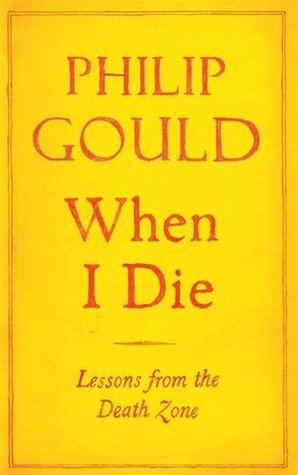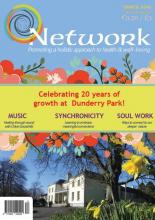Book review: When I Die by Philip Gould

I found this book on a friend’s shelf, it had Sunday Times Best Seller on the cover so I decided to take it on holiday. It is the last writing of Philip Gould (Lord Gould) and is his account from diagnosis of oesophageal cancer , through radical, invasive medical treatment and surgery to his final days. He writes right up to the end.
Gould was an advisor to Tony Blair’s New Labour Party . He was a professor of Economics at LSE. He was driven by many passions. His capacity for work was legendary and he was an inspiration to many.. The start of his book was a harrowing read. He details his treatment options and opts for radical surgery not once but twice followed by periods in intensive care, radiotherapy and chemotherapy. Philip Gould suffered as much as a human being can. It was difficult at times to continue reading and several times I nearly put it down. I am so glad I didn’t.
What is extraordinary about this book is his perseverance and ability to give meaning to his predicament without any self-pity. When he realizes that the treatment is no longer working the whole tone of the book shifts from a medical history to another personal/spiritual dimension entirely.
I have read many of the great wisdom teachings about Death and Dying and many spiritual texts and meditation practices over the years as it is one of my areas of interest , but here is something, a text, of an entirely different dimension since Gould does not seem to have a spiritual practice to sustain him. He is not a seasoned spiritual practitioner. His life- long interest has been people and politics. The only mention of religion is a reference to a conversation he had with Tony Blair who is a deeply devout Catholic.
The gears shift when he is face to face with death. There is no way out. It’s just a matter of time. As Victor Frankl says in Man’s Search For Meaning there is always choice and Gould says, “The only way to have a good death is to accept it, and to understand that for many people, if not most, death is the most important time of their life.” He speaks about the reckonings that he is able to resolve with the important people in his life and that this is part of the way that death gives meaning to our lives and how this process opens the heart to an intensity of love he had almost never felt before saying, “There have been good times and bad times. But these are new times.”
For anyone, a terminal diagnosis is a catastrophe, plans suddenly change and a new reality is thrust unwillingly upon everyone. It’s also a process. Acceptance of the near reality of death is key and as Gould says, “You gain freedom. You gain power. You gain courage.” Simply put. Deeply wise. These are the qualities of a real spiritual warrior. Gould writes, “The moment I accepted death and looked it in the eye and faced it, then I had, not defeated death, you cannot defeat death, but freed myself from death. I had shown myself that I have the courage to be able to transcend death. Maybe I cannot beat death, but death cannot beat me.”
The chapter entitled “The Death Zone” is a profound teaching. This is not an intellectual fiction but a deeply lived wise spiritual teaching. He is living and describing his dying, bravely confronting it and himself and chewing the marrow out of every last moment of his life. Death gets closer with each word on the page ( as it is doing for us all) and he realises that he has the ability to deal with everything that cancer has thrown at him, the pain, the anguish, the uncertainty, the suffering and the myriad losses at multiple levels. “It is possible to deal with it all. Realising that changes you as a person.”
Gould would never have called himself courageous but when forced by circumstance to dig deep he says, “ I found the courage to deal with this acute and terrible pain.” He was tested time and again by the relentlessness of the disease and “what I have found is that, as it goes on, you get stronger and stronger and stronger and freer and freer and freer... in the end you lose your fear of the next step because you know that you will be able to take it.”
After his second recurrence Gould realised that he was lacking purpose and was lost and he says that, “finding a purpose, became my purpose.”
His purpose then was to write about the process of dying. An increasingly urgent purpose since he did not know how long he had left to life. Was it weeks or days? He needed to articulate his feelings and into the mix of the rollercoaster of emotions came unexpected unsolicited moments of sheer ecstasy and bliss. Life took on a hitherto unknown sharpness of focus honed by the richness of the details of the present moment. Such moments of richness and joy were in sharp contrast to and yet caused by, the ever present imminent proximity of death. “There is ecstasy because I am not dead yet,” he writes.
His main intention he says is to change the perception that most people have of death and this became an added purpose. He tried to change perceptions of politics and now he “wants to lead people to understand that what they are told about death is not necessarily the reality.”
Luckily , he had good friends and a loving family to sustain him. Gould and his wife endured days of heart rending sadness, unbearable moments of future loss but a great breakthrough after this sadness was his realisation that, “We bounced back. We moved to a different place and a different time. It was a totally transcendent moment. I now saw that the purpose I had been seeking was to give as much love as I could. Even though I was dying, I knew that was what I had to do. It was clear, there was absolutely no ambivalence about it... my life gained a kind of intensity that it had never had before. It gained a quality and a power that it had never had before.”
Despite his challenges, he notes that he is actually enjoying this precious time with family and friends and having the most fulfilling time of his life because of the intensity that the situation of honesty and acceptance elicits. The bliss of the moments develops into a deep inner peace, “the gain has been greater than the pain.” What an extraordinary and unexpected confession from a dying man and he adds, “the chance of fulfilment makes this the most extraordinary and important time of your life…. Can you enjoy it? Yes, you can. Should you enjoy it? If you can!”
The wisdom he communicates is that Life is a continuous process, we are constantly changing and developing and that in Life we can actively heal our relationships through deep understanding and communicating the love that we all have inside our hearts and he realises that “this surge of understanding takes you into a different state of being.” It lifts him into a realisation that the most important way to understand life is not by time but by emotions, feelings and relationships, “other, richer conceptions of progression…the sense of God, the sense of Divinity. There is no future for me now so I am flowing back and this here is the place for everything.”
Despite living with the challenges of his worsening condition he writes, “even though this may well be the worst of times, it is also the best of times.” He knows that when you confront fear, you transcend it. “You go to another place. You really do.”
Philip Gould shows us the way to a good death. Despite suffering enormous anguish and physical pain he finds the courage to transcend it all. He demonstrates and lives a good Death and generously allows us to journey with him and to learn from his choices. It is his choices and his attitudes that liberated him. This book is a wonderful teaching for all who read it. Whatever comes your way. You can find the inner strength to transcend it. It’s not easy but whoever said that real transformation would be?
Thank you Philip Gould for your generosity by writing When I Die.
Latest Issue
Upcoming Events
-
17/04/2020 to 26/04/2020
-
18/04/2020
-
23/04/2020
-
15/05/2020 to 23/05/2020
-
16/05/2020 to 17/05/2020
Recent Articles
Article Archive
- November 2011 (2)
- January 2012 (3)
- February 2012 (2)
- March 2012 (2)
- April 2012 (4)
- May 2012 (4)
- June 2012 (1)
- July 2012 (3)
- August 2012 (2)
- October 2012 (2)

